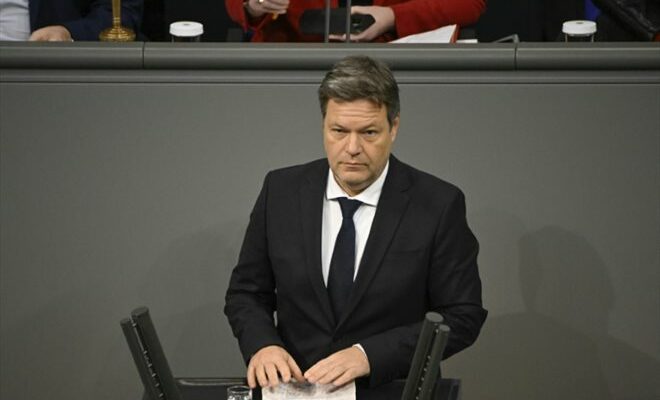Economy Minister Robert Habeck in the Bundestag, January 26, 2023 (AFP/Archives/Tobias SCHWARZ)
Germany recorded a 0.2% drop in its GDP in the fourth quarter of 2022, weighed down by the energy crisis and inflation, which however had a less severe impact than initially feared, according to a first estimate published Monday.
“After holding up well in difficult conditions during the first three quarters, economic performance declined slightly,” the Destatis institute said in a statement.
After resisting throughout the year and carrying activity, household consumption faltered at the start of winter, underlines the institute to explain this slowdown.
“A recession, at least short-lived, is becoming more likely,” said Jens-Oliver Nikasch, analyst for LBBW bank. If GDP also fell in the first quarter of 2023, Europe’s largest economy would technically go into recession.
The indicator for the 4th quarter did less well than expected by analysts on the financial platform Factset, who had forecast zero growth at 0.0%.
Over the year as a whole, the German economy experienced a 1.8% increase in GDP, slightly revised downwards compared to the first estimate.
The energy crisis, caused by the war in Ukraine, has shaken up the German economic model, based in particular on the massive importation of inexpensive gas from Russia. The war put an end to Russian deliveries, causing prices to soar in Europe for part of the year.
Inflation soared, as production costs in industry, the engine of German growth, fueling fears of a major economic crisis for the country. Although the German economy slumped, it generally held up better than feared in view of the impact of the Russian invasion of Ukraine, according to the government.
“If ever a recession occurs, it will be shorter and less severe”, and will be “compensated by a return to growth from the spring”, recently assured the Minister of Economy Robert Habeck, assuring that a “crisis economic crisis” had been avoided.
The government now forecasts growth of 0.2% over the whole of 2023 and no longer a recession.
Several factors explain this resilience. Energy prices, especially gas, have fallen in recent months, thanks to a mild winter in Europe, and Berlin’s efforts to increase its supply of liquefied gas.
Germany then spent lavishly to support households and made it possible to preserve the consumption dynamic set in motion at the start of 2022 by the lifting of restrictions against the Covid-19 pandemic.
On the supply side, the gradual improvement in supply chain tensions in global markets has relieved the export industry.
© 2023 AFP
Did you like this article ? Share it with your friends with the buttons below.




